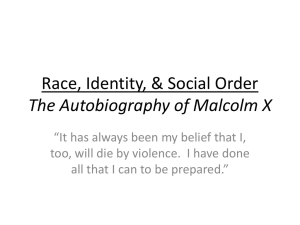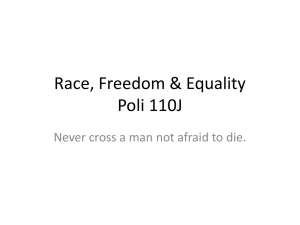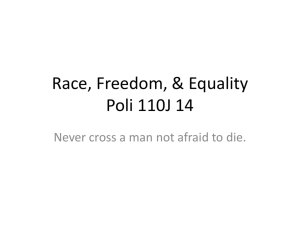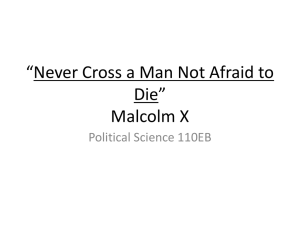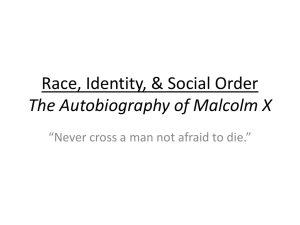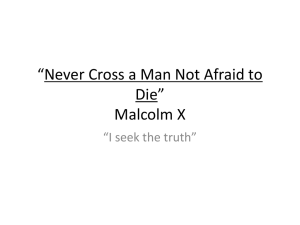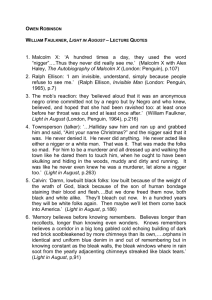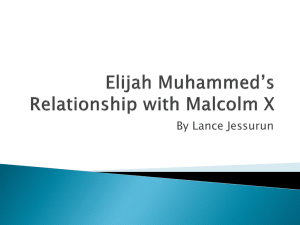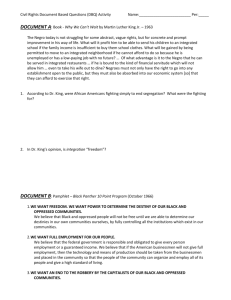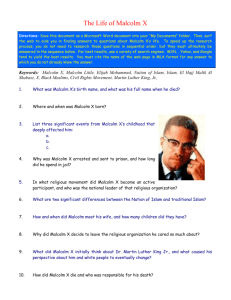Race, Freedom & Equality Poli 110J
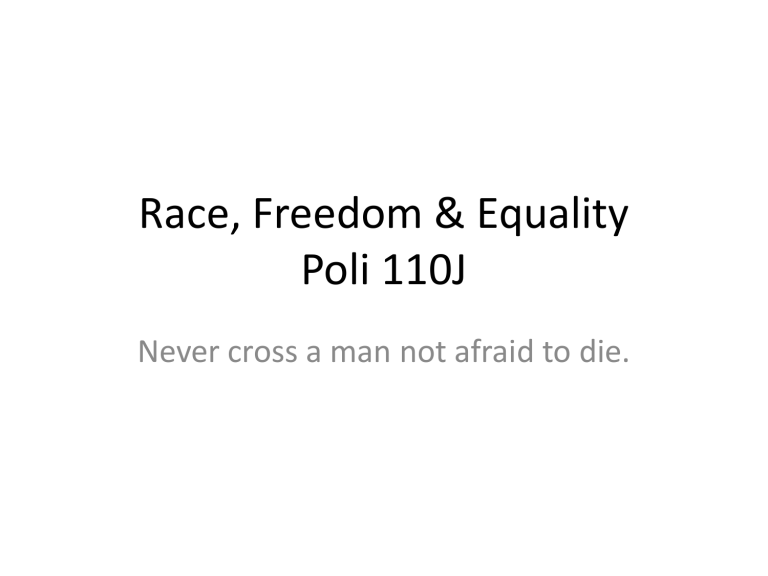
Race, Freedom & Equality
Poli 110J
Never cross a man not afraid to die.
• Adult language advisory
The Autobiography of Malcolm X
• Read this text as an argument in the first person, not a personal affirmation
– The claim is not that Malcolm
X’s experience is remarkable, but that it is not
• Malcolm Little Satan
Malcolm X El-Hajj Malik El-
Shabazz
• Atheist Nation of Islam
Sunni Islam
• Themes
– Systematic racism
– Degradation & dehumanization
– Pervasive violence and domination
– Self-loathing
– Oppression of ideas
– Liberating power of truth
– Positive liberty
– Race consciousness
– Dignity, honesty & order
Systematic Violence
• “When my mother was pregnant with me, she told me later, a party of hooded Ku Klux Klan riders galloped up to our home in Omaha,
Nebraska, one night.” (3)
– From even before the beginning
Systematic Violence
• Sundown Towns
– No blacks allowed on streets after dark
• Mother the product of rape by a white man
• Father murdered by white supremacist Black
Legion
– Four of father’s six brothers killed by whites
• Home burned to the ground by Black Legion
– “The white police and firemen cam and stood around watching as the house burned down to the ground.”
(6)
Systematic Violence
• Example of systematized racism:
• Father’s skull crushed, laid across streetcar tracks and cut almost in half
– Ruled a suicide
• “How could my father bash himself in the head, then get down across the streetcar tracks to be run over?”
(14)
– Insurance won’t pay off
– Family sinks into poverty
Systematic Racism
• Mother must raise eight children alone
– Life of constant insult: living on charity and passing as white
– Fired whenever it is discovered that she is black
• Constant humiliation & degradation
– Stress & shame causes mental illness
– Family broken up by welfare agency
• “The monthly welfare check was their pass. They acted as if they owned us, as if we were their private property.” (16)
The oppressive power of names
• “Soon, nearly everywhere my father went,
Black Legionnaires were reviling him as an
‘uppity nigger’ for wanting to own a store, for living outside the Lansing Negro district, for spreading unrest and dissention among ‘the good niggers.’” (5)
– Good = subservient
– To want to live as a free & independent man is
“uppity”, i.e. not to be permitted of black men.
The oppressive power of names
• “The white kids didn’t make any great thing abut us, either. They called us ‘nigger’ and ‘darkie’ and ‘Rastus’ so much that we thought those were our natural names. But they didn’t think of it as an insult; it was just the way they thought about us.” (12)
– Internalizing the contempt of the oppressor
– The contempt is casual, unthinking. So habitual that it isn’t even thought of as an insult.
– Demonstrates the unquestioned systematization of white power
– Part of Malcolm X’s goal is to reveal this power & strip it of it’s legitimacy
The oppressive power of names
• From his favorite teacher: “Malcolm, one of life’s first needs is for us to be realistic. Don’t misunderstand me, now. We all here like you, you know that. But you’ve got to be realistic about being a nigger.”
– Systematic racial oppression seen as just the way it is.
The oppressive power of names
• “A lawyer—that’s no realistic goal for a nigger.
You need to think about something you can be. You’re good with your hands—making things. Everybody admires your carpentry shop work. Why don’t you plan on carpentry?” (43)
– Don’t be what you are or what you can be, be what the system of racist oppression wants to make of you.
The oppressive power of names
• “Where ‘nigger’ had slipped off my back before, wherever I heard it now, I stopped and looked at whoever said it. And they looked surprised that I did.
• “I quit hearing so much ‘nigger’ and ‘What’s wrong?’—which was the way I wanted it.” (44)
Internalizing Contempt
• For Malcolm X, the problem is not only oppression by white society, but its acceptance by blacks themselves.
• “I actually believe that as anti-white as my father was, he was subconsciously so afflicted with the white man’s brainwashing of Negroes that he inclined to favor the light ones, and I was his lightest child.” (7)
Internalizing Contempt
• “I was among the millions of Negroes who were insane enough to feel that it was some kind of status symbol to be born lightcomplexioned—that one was actually fortunate to be born thus.” (5)
Internalizing Contempt
• “How ridiculous I was! Stupid enough to stand there lost in admiration of my hair now looking ‘white,’… I vowed that I’d never again be without a conk, and I never was for many years.
• This was my first really big step toward selfdegradation: when I endured all that pain, literally burning my flesh to have it look like a white man’s hair.” (64)
Internalizing Contempt
• “In any black ghetto in America, to have a white woman who wasn’t a known, common whore was—for the average black man, at least—a status symbol of the first order.” (78)
Internalizing Contempt
• “They prided themselves on being incomparably more ‘cultured,’ ‘cultivated,’
‘dignified,’ and better off than their black brethren down in the ghetto, which was no further away than you could throw a rock.
Under the pitiful misapprehension that it would make them ‘better,’ these Hill Negroes were breaking their backs trying to imitate white people.” (48)
Internaliz Contempt
• “So many of those so-called ‘upper class’
Negroes are so busy trying to impress on the white man that they are ‘different from those others’ that they can’t see they are only helping the white man to keep his low opinion of all Negroes.” (123)
– Division of the black community against itself
– Identification with the oppressor
– “White” understood to mean “better”, “black” to mean “worse”
Dehumanization
• “In the ghettoes the white man has built for us, he has forced us not to aspire to greater things, but to view everyday living as survival—and in that kind of community, survival is what is respected.” (105)
– A life of oppression and brutality leaves the individual brutalized
– In the absence of even the possibility of better things,
Malcolm X at this point in his life embraces a form of nihilism. He sees his life of self-loathing, drugs, sex, and crime as self-degradation.
– This is due in part to a lack of self-knowledge and selfrespect
The color line
• “We laughed about the scared little Chinese whose restaurant didn’t have a hand laid on it, because the rioters just about convulsed laughing when they saw the sign the Chinese had hastily stuck on his door: ‘Me Colored
Too.’” (131)
The color line
• “Hymie really liked me, and I liked him. He loved to talk. Half his talk was about Jews and Negroes.
Jews who had anglicized their names were
Hymie’s favorite hate. Spitting and curling his mouth in scorn, he would reel off names of people he said had done this.” (143)
• The race card: “Who in the world’s history has ever played a worse ‘skin game’ than the white man?” (206)
• “She knew from personal experience how crime existed only to the degree that the law cooperated with it. She showed me how, in the country’s entire social, political and economic structure, the criminal, the law, and the politicians were actually inseparable partners.” (134)
– No legitimate authority: Law, religion, society all complicit in racist oppression & hypocrisy
• The curse of Ham
Being toward death
• “I believed that a man should do anything that he was slick enough, or bad and bold enough, to do and that a woman was nothing but another commodity.” (155)
• “Deep down, I actually believed that after living as fully as humanly possible, one should then die violently.” (159)
• “I lived and thought like a predatory animal.”
(155)
“The white man is the devil.”
My mind “flashed across the entire spectrum of white people I had ever known; and for some reason it stopped upon Hymie, the Jew, who had been so good to me….
I said, “Without any exception?”
“Without any exception.”
• Black Legion
• Welfare officials
• Judges
• Teachers
• Cops
• Johns
• Customers
• Sophia
• Etc.
• “Here is a black man caged behind bars, probably for years, put there by the white man. Usually the convict comes from among those bottom-of-the-pile Negroes, the
Negroes who throughout their entire lives have been kicked about, treated like children—Negroes who have never met one white man who didn’t either try to take something from them or do something to them.” (211)
• “You don’t even know who you are,” Reginald had said. “You don’t even know, the white devil has hidden it from you, that you are from a race of people of ancient civilizations, and riches in gold and kings.” (186)
– History & education
• Slavery
• Opium war
– “History had been ‘whitened’” (187)
– “This ‘Negro’ had been taught to worship an alien God having the same blond hair, pale skin, and blue eyes as the slavemaster.” (188)
This History of Yacub
• ‘Muslim’ used to refer both to members of the
Nation of Islam and followers of orthodox
Islam
• “The humans resulting, he knew, would be, as they became lighter, and weaker, progressively also more susceptible to wickedness and evil.”
– Affirmation of blackness
– Devaluation of whiteness
Conversion
• “If you will take one step toward Allah—Allah will take two steps toward you.” (181)
• “I was going through the hardest thing, also the greatest thing, for any human being to do; to accept that which is already within you, and around you.” (189)
• “The very enormity of my previous life’s guilt prepared me to accept the truth.” (189)
Ordering
• “I had never dreamed of anything like that atmosphere among black people who had learned to be proud they were black, who had learned to love other black people instead of being jealous and suspicious”
• Prayer, ablution, family order
• “Even the children spoke to other children” with
“mutual respect and dignity…. Beautiful!” (224)
– Order, cleanliness, & respect
– The problem is not with us...
A new self
• For me, my “X” replaced the white slavemaster name of “Little” which some blue eyed devil named Little had imposed upon my paternal forebears.” (229)
– Break with the past
– Rejection of whiteness
• “Think of hearing wives, mothers, daughters being raped! And you were too filled with
fear of the rapist to do anything about it?”
(232)
– Fear, power, & violence
The whole point in a joke
• “’Do you know what white racists call black
Ph.D’s? He said something like, “I believe I happen to not be aware of that”—you know, one of these ultra-proper talking Negroes.
And I laid the word down on him, loud:
Nigger!” (327)
• “If Malcolm X were not a Negro, his autobiography would be little more than a journal of abnormal psychology, the story of a burglar, dope pusher, addict, and jailbird— with a family history of insanity—who acquires messianic delusions and sets forth to preach an upside-down religion of ‘brotherly’ hatred.” Saturday Evening Post, Sept. 12, 1965
• “For the white man to ask the black man if he hates him, is just like the rapist asking the
raped, or the wolf asking the sheep, ‘Do you hate me?’ The white man is in no moral
position to accuse anyone else of hate!” (277)
• “The Jew will never forget that lesson [of the
Holocaust]… they used violence to force the
British to help them take Palestine, “and then the Jews set up Israel, their own country—the one thing that every race of man in the world respects, and understands.” (320)
– Why is this something universally understood?
The Transformative Power of Truth
• Marcuse and the destructive & soteriological potential of the Truth over fact
– Asceticism
– Order
– Transformation
• Nation of Islam’s 6-step recovery program
• 1. Admit you’re a junkie
– Usually “fished” by a converted friend & former junkie, overcoming distrust & suspicion
• 2. Understand why you’re a junkie
– “Narcotizing themselves against being a black man in the white man’s America.” Helps to “prove” inferiority of the black man. (300)
– “What’s a black man buying Whitey’s dope for but to make Whitey richer—killing yourself!”
– “The Muslim often collects audiences of junkies.
They listen only because they know the clean-cut proud Muslim had earlier been like them.” (299)
• 3. The way to quit drugs is through the message of the Nation of Islam
– Brought to a Muslim restaurant, “the addict hears himself called, genuinely, ‘Brother,’ ‘Sir,’ and ‘Mr.’
No one cares about his past.”
• 4. The message of the Nation gives lets the addict realize that he has the inner strength to change.
– “For the first time he is feeling the effect of black self-pride. That’s a powerful motivation for a man who has been existing in the mud of society. In fact, once he is motivated no one can change more completely than the man who has been at the bottom. I call myself the best example of that.”
• 5. Voluntarily go cold turkey
– When the ordeal is over, “he will never forget these brothers who stood by him during this time.
He will never forget that it was the Nation of
Islam’s program which rescued him from the special hell of dope.” (301)
• 6. The convert in turn goes “fishing”
– “The ex-addict, when he is proud, clean, renewed, can scarcely wait to hit the same junkie jungle he was in, to ‘fish’ out some buddy and salvage him!”
(301)
• “The only thing that anybody… could ever find me guilty of, was being open-minded. I said I was seeking for the truth…” (428)
– Deep commitment to truth
– His faith in the Hon. Elijah Muhammed was the core of his being
• “It felt as though something in nature had failed, like the sun, or the stars.” (351)
• Who is he now?
The last conversion
• Takes the Hajj
– On the Hajj, “You could be a king or a peasant and no one would know.”
– “Everything about the pilgrimage atmosphere accented the Oneness of Man under one God” (380)
– Kindness & brotherhood with all Muslims, even those who would be white
– “The holy city of Mecca had been the first time that I had ever stood before the Creator of All and felt like a complete human being.” (420)
• Double consciousness
• White & black people not the problem, whiteness and blackness are the problem
– “That morning was when I first began to reappraise the ‘white man.’ It was when I first began to perceive that ‘white man,’ as commonly used, means complexion only secondarily; primarily it described attitudes and actions. In America, ‘white man’ meant specific attitudes and actions toward the black man, and toward all other non-white men.” (383)
• Whiteness is essentially defined in US by rejection of & dominance over non-whites
• While approach to race changes, militancy does not
– Racial cooperation
• “I don’t mind shaking hands with human beings. Are you one?” (418)
– Black militancy
– Not black nationalism, but black inter-nationalism.
• “To come right down to it, if I take the kind of things in which I believe, then add to that the kind of temperament that I have, plus the one hundred percent dedication I have to whatever I believe in—these are the ingredients which make it just about impossible for me to die of old age.” (435)
• “If I can’t be safe among my own kind, where can I be?” (497)
Ossie Davis’ Eulogy
• “Malcolm said to hell with that! Get up off your knees and fight your own battles. That’s the way to win back your self-respect. That’s the way to make the white man respect you.
And if he won’t let you live like a man, he certainly can’t keep you from dying like one!”
Ossie Davis’ Eulogy
• Malcolm X, John Brown, and responsibility
Ossie Davis’ Eulogy
• “It was impossible to remain defensive and apologetic about being a negro in his presence. He wouldn’t let you. And you always left his presence with the sneaky suspicion that maybe, after all, you were a man!”
